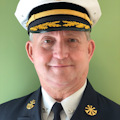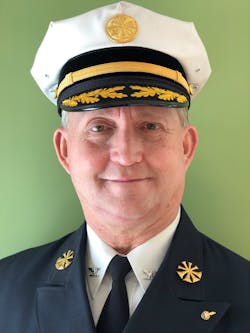The call for duty for all first responders—fire, EMS, police—is to help to save people and to ease suffering every day. We all took on this responsibility to facilitate good outcomes when people are having the worst moment of their life. Career, part-time or volunteer, we all stand together, working in unity, saving lives and property, but who is watching out for us?
You and your family
Most of the outside world doesn’t know or can’t comprehend the toll that our job has on us. All first responders are physically and emotionally stressed daily. The position also affects spouses, family and friends, because of working long hours, different shifts, holidays, bad weather, and other abnormal conditions that influence our life and well-being. All of these have proven to cripple and even shorten our life. Our profession offers the benefits of helping others, but at what risks?
Your priority is to look out for No. 1—yourself and your family. It’s the little things that really can affect or alter the outcome of your life. Eat better, exercise more, don’t smoke or vape, limit caffeine and alcohol consumption, stay well-rested, schedule regular physicals and enjoy life. Any of these can be extremely difficult, but you must endure.
Use all safety equipment all of the time to help to prevent injury and illness.
The next priority is to look out for all of your first responder brothers and sisters. We all work together closely. Sometimes it takes someone who is on the outside to recognize whether an issue or problem is developing. Be supportive and understanding. Treat everyone as if they are family, because they are. Look for personality changes, weight gain or loss, unusual behavior, changes in hygiene and anything that strikes you as a possible red flag. Ignoring these can lead to untoward circumstances, drastically altering life.
Then one day …
Working for more than a half of a century in fire and EMS, I didn’t realize all of the stresses that are involved and the toll that it took on my body. I never smoked cigarettes or cigars but was exposed to a lot of smoke and hazardous materials from fires. I exercised at least five times per week and ate relatively healthfully most of my life. I never consumed a lot of alcohol nor did I do any drugs. However, my life drastically changed when I was 59 and I had my first heart attack. I had minimal signs and symptoms while working at least 60 hours per week in a large department. I never experienced any chest pain.
Thankfully, I previously had seen a cardiologist. All my tests were negative. I passed several stress tests with flying colors. He said that the only real way to test my heart was a cardiac catheterization.
One Monday morning in 2015, I scheduled an outpatient catheterization. I worked 14 hours the day before and was feeling great but a little apprehensive. The procedure went smoothly but ended very differently than I expected. I still can remember what my cardiologist told me right after. He stated, “I can’t help you.” Boy, did that statement wake me up faster with deep interest. My coronary arteries were blocked more than 80 percent. I was admitted to the intensive care unit and had bypass surgery the next day. My doctor said the only reason I was alive was that I exercised every day, and my heart could handle the load. I ended up undergoing quintuple bypass surgery and was in the hospital for a week.
I was rehabilitated and went back to work in about three months. It was a difficult road, but worth it in the long run.
Three years later, I was rushed to the hospital. I had a second heart attack, and I received two stents. Again, I went back to work shortly thereafter.
In 2019, I was diagnosed with acute respiratory distress syndrome, which was caused by inhalation of smoke and toxic chemicals. I retired at that point.
Yes, the job is stressful and takes a toll. That said, the human body is a fantastic machine, having idiot lights built in. If you experience any strange sign or symptom, don’t hesitate to get checked. That very well might save your life.
Watch all of your brothers and sisters on and off of the job to help them to recognize simple warning signs, whether they be physical or mental. You must help each other while helping strangers.
About the Author

Richard Bossert
Richard Bossert is a retired operations chief for the Philadelphia Fire Department. He started in the fire/rescue services in 1970, volunteering for the Warminster, PA, Fire Department. He worked for three career fire departments: Chester, Bensalem and Philadelphia. Bossert became a certified EMT in 1973, then paramedic in 1980. He received a bachelor’s degree in pre-med from Pennsylvania State University in 1977 and a master’s degree in public safety administration from St. Joseph’s University in 2003.
